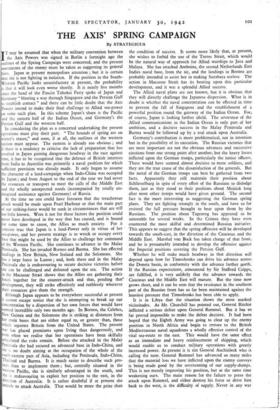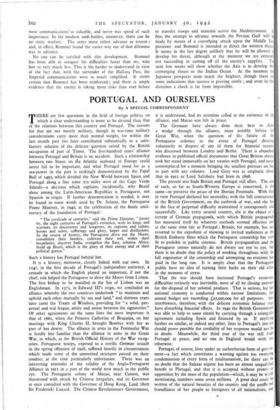THE AXIS' SPRING CAMPAIGN
By STRATEGICUS T may be assumed that when the military convention between the Axis Powers was signed in Berlin a fortnight ago the times of the Spring Campaign were concerted, and the present novements of the enemy must be taken as suggesting its general nes. Japan at present monopolises attention ; but it is certain hat she is not fighting in isolation. If the position in the South- estern Pacific looks unsatisfactory at present, the probability s that it will look even worse shortly. It is nearly five months
since the head of the Fascist Tohokai Party spoke of Japan and ermany " blasting a way through Singapore and the Persian Gulf o establish contact " and there can be little doubt that the Axis owers intend to make their final challenge to Allied sea-power n some such plan. In this scheme Japan's share is the Pacific and the eastern half of the Indian Ocean, and Germany's the ersian Gulf and the western half.
In considering the plan as a concerted undertaking the present perations must play their part. " The hounds of spring are on inter's traces," and soon, if at all, the outlines of the western section must appear. The eastern is already too obvious ; and .1 there is a tendency to criticise the lack of preparation that has esulted in Japan gaining dangerous headway in the race against time, it has to be recognised that the defence of British interests ram India to Australia was primarily a naval problem for which sufficient provision was already made. It only began to assume the character of a land-campaign when Indo-China was occupied by Japan ; and from August to the end of the year we had never the resources or transport to meet the calls of the Middle East and the wholly unexpected needs (accompanied by totally un- magined assistance against Germany) of Russia.
At the time no one could have foreseen that the treacherous attack would be made upon Pearl Harbour or that the main part of our striking-force would be sunk in circumstances that are still too little known. Were it not for these factors the position could ever have developed in the way that has caused, and is bound for some time to cause, the Allies so much anxiety. For it remains true that Japan is a land-Power only in virtue of her sea-power, and her present strategy is to wreck or occupy every base that might be used by the Allies to challenge her command f the Western Pacific. She continues to advance in the Malay eninsula. She has invaded Borneo and Burma. She has effected landings in New Britain, New Ireland and the Solomons. She as a large force in Luzon ; and, both there and in the Malay Peninsula she is endeavouring to secure decisive victories before she can be challenged and defeated upon the sea. The action an the Macassar Strait shows that the Allies are gathering their forces together for the counter-attack and that, pending that' evelopment, they will strike effectively and ruthlessly wherever their resources give them the strength.
Although Japan appears to be everywhere successful at present
t cannot escape notice that she is attempting to break up our oncentration by a dispersion of her own forces that would have eemed incredible only two months ago.. In Borneo, the Celebes, ew Guinea and the Solomons she is striking at distances from er main bases that are either equal to, or greater than, those Inch separate Britain from the United States. The present ar has placed premiums upon living thus dangerously, and Yen when we realise that her operations have been skilfully articulated the risks remain. Before she attacked in the Malay eninsula she had secured an advanced base in Indo-China, and she I no doubt aiming at the occupation of the whole of the south-eastern part of Asia, including the Peninsula, Indo-China, Thailand and Burma. It is much easier to describe such pro- ject, than to implement them ; but, -centrally situated in the 'estern Pacific, she is similarly advantaged in the south, and she :s endeavouring to exploit her position to the east, in the direction of Australia.. It is rather doubtful if at present she tends to attack Australia. That would be more the prize than
the condition of success. It seems more likely that, at present, she wishes to forbid the use of the Torres Strait, which would be the natural way of approach for Allied warships to Java and Malaya. She has attacked Amboina, the second Netherlands East Indies naval base, from the air, and the landings in Borneo are probably intended to assist her in making Surabaya useless. The action in Macassar Strait has its bearing upon this particular development, and it wac a splendid Allied success.
The Allied naval plans are not known, but it is obvious that they will directly challenge the Japanese dispersion. What is in doubt is whether the naval concentration can be effected in time to prevent the fall of Singapore and the establishment of a powerful position round the gateway of the Indian Ocean. For, of course, Japan is looking farther afield. The severance of the Allied communications in the Indian Ocean is only part of her ambition, and a decisive success in the Malay Peninsula and Burma would be followed up by a real attack upon Australia.
Germany's contribution is more problematical, not in intention but in the possibility of its execution. The Russian victories that are most important are not the obvious advances and successive ejections from one strong point after another, but the heavy losses inflicted upon the German troops, particularly the junior officers.
These would have seemed almost decisive to mere soldiers, and they are the true cause of the dissatisfaction of the generals. But the metal of the German troops can best be gathered from two facts. Apparently they still maintain their position about Schliisselburg in spite of every effort of the Russians to dislodge them, just as they stood to their positions about Mojaisk long after most other troops would have given ground. The second fact is the more interesting as suggesting the German spring plans. They are fighting strongly in the south, and have so far resisted the full pressure brought to bear upon them by the Russians. The position about Tagenrog has appeared to be untenable for several weeks. In the Crimea they have even countered the most skilful and determined Russian initiative.
This appears to suggest that the spring offensive will be developed towards the south-cast, in the direction of the Caucasus and the Middle East. Marshal von Bock has taken charge of that front, and he is presumably intended to develop the offensive against the Imperial positions covering the Persian Gulf.
Whether he will make much headway in that direction will depend upon how far Timoshenko can drive his advance across the Donetz basin, in conformity with the advance farther north.
If the Russian expectations, announced by Sir Stafford Cripps, are fulfilled, it is very unlikely that the advance towards the Caucasus and the Middle East will mature. But the time now grows short, and it can be seen that the resistance in the southern part of the Russian front has so far been maintained against the heaviest pressure that Timoshenko has been table to apply.
It is in Libya that the situation shows the most marked vicissitudes. As Mr. Churchill has pointed out, General Ritchie inflicted a serious defeat upon 'the Rommel. But it has so far proved impossible to make the defeat decisive. It had been hoped that the Eighth Army was going to clear up the enemy position in North Africa and begin to restore to the British Mediterranean naval squadrons a wholly effective control of the vital sea-route to the east. This would have the same effect as an immediate and heavy reinforcement of shipping, which would enable us to conduct military operations with greatly increased power. At present it is not General Auchinleck who is calling the tune. General Rommel has advanced so many miles that the material loss we have inflicted upon the enemy convoys is being made good by the overrunning of our supply-dumps.
This is not merely improving his position, but at the same time weakening ours. The main reason for the failure to press the attack upon Rommel, and either destroy his force or drive him back to the west, is the difficulty of supply. Never in any war were communications so valuable, and never was speed of such to transfer troops and material across the Mediterranean. importance. In the modern tank-battles, moreover, there can be fine, the attempt to advance towards the Persian Gulf will h no static warfare. The army must either advance or retreat ; made by means of a converging attack upon the Middle Eas and, in effect, Rommel found the easier way out of that dilemma positions and Rommel is intended to direct the western thrust was to advance. It seems in the last degree unlikely that he will be allowed No one can be satisfied with this development. Rommel develop his threat, although at the moment. we are certainly has been able to conquer his difficulties faster than we, who not succeeding in cutting off all the enemy's supplies. The lost so very much less. This is the harder to understand in view next few weeks will show whether the Axis is to develop this of the fact that, with the surrender of the Halfaya Pass, the converging thrust to the Indian Ocean. At the moment Imperial communications were so much simplified. It seems Japanese prospects seem much the brighter, though there an certain that Rommel has been reinforced ; and there is ample some indications that success is proving costly ; and even in that evidence that the enemy is taking more risks than ever before direction a check is far from impossible.



























 Previous page
Previous page